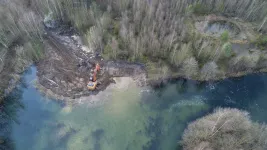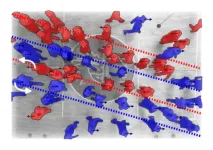(Press-News.org) A review of gene editing techniques suggests that the CRISPR/Cas (clustered regularly interspaced short palindromic repeats/Cas) method could be a possible ‘saviour’ for rice crops threatened by climate change and high food demand.
The study, published in CABI Reviews, highlights that while rice is one of the most consumed cereals worldwide and feeds about three billion people, climate-induced abiotic and biotic stresses have affected the production and quality of rice crops.
Dr Antonio Costa de Oliveira, lead author of the Federal University of Pelotas, Brazil, and a team of fellow scientists found that the CRISPR/Cas tool was efficient in gene editing in studies related to yield, tolerance to biotic and abiotic stresses and rice grain quality.
However, the review, which sought to describe the different gene editing techniques and their respective applications in rice breeding, argues that the impact of the CRISPR/Cas approach in breeding programmes depends upon the cultivation of the edited plants on a large scale in the field.
Dr Costa de Oliveira said, “The development of new, higher yielding cultivars is necessary to ensure global food security.
“Although great progress has already been achieved by conventional breeding, biotechnological tools, such as transgenics and genome editing, can aid in meeting future demands.
“Gene editing is characterized by cutting and modifying target genes. Among the genome editing techniques, CRISPR/Cas has been proposed because of its ease of manipulation.
“Variants such as multiple Cas proteins, base editing and prime editing, which aim to increase editing efficiency have also been proposed. Edited plants are also more accepted because they are transgene free.”
The study outlines that a 50% increase in the current consumption of rice is projected for 2050 – which would mean a demand as high as 1.125 billion tonnes.
But the occurrence of biotic stresses (diseases – viruses, bacteria, fungi, nematodes, pests and weeds) coupled with abiotic stresses (drought, submergence, salinity, heat, cold and heavy metals) is a limiting factor for rice production.
Climate change also influences the frequency, intensity and duration of these stresses, the scientists say. Therefore, it is necessary to develop new rice cultivars with tolerance to stress and higher yield potential, since the expansion of the cultivated area is limited.
Dr Costa de Oliveira added, “The high potential of CRISPR/Cas9 editing, for instance, has aided in the development of broad-spectrum resistance against bacteria, fungi and viruses by silencing susceptibility genes and the insertion of resistance genes.
“In this sense, CRISPR/Cas9-mediated genome editing has made it possible to introduce mutations in three promoters of the SWEET gene that resulted in rice lines with broad-spectrum resistance to Xanthomonas oryzae pv. Oryzae.”
The researchers conclude by stating that although conventional breeding has been decisive so far, there is still a long way to go in order to meet future demands and face the challenges of rice cultivation.
“plants improved from genome editing and conventional breeding are similar in terms of risks to the environment and human health, which are practically non-existent,” Dr Costa de Oliveira said. “Therefore, it is expected that edited plants, in addition to meeting the demands, have good acceptance among consumers.”
Additional information
Main image: A scientist inspects rice in China (Credit: CABI).
Full paper reference
Nizolli, Valeria de Oliveira; Oliveira, Victoria Freitas de; Maia, Luciano Carlos da; Pegorario, Camila; de Oliveira, A. C. ‘Gene editing techniques in rice: new paths for an old crop,’ CABI Reviews, 3 March (2023). DOI: 10.1079/cabireviews.2023.0008
The paper can be read open access from 00:01hrs UK time 3 March, 2023, here: https://www.cabidigitallibrary.org/doi/10.1079/cabireviews.2023.0008
Media enquiries
For more information and an advance copy of the paper contact:
Dr Antonio Costa de Oliveira, Federal University of Pelotas, Brazil – email: acostol@gmail.com
Wayne Coles, Senior PR Manager, CABI – email: w.coles@cabi.org
About CABI Reviews
CABI Reviews is a reviews journal covering agriculture, global health, nutrition, natural resources and veterinary science.
About CABI
CABI is an international not-for-profit organization that improves people’s lives by providing information and applying scientific expertise to solve problems in agriculture and the environment.
Through knowledge sharing and science, CABI helps address issues of global concern such as improving global food security and safeguarding the environment. We do this by helping farmers grow more and lose less of what they produce, combating threats to agriculture and the environment from pests and diseases, protecting biodiversity from invasive species, and improving access to agricultural and environmental scientific knowledge. Our 49-member countries guide and influence our core areas of work, which include development and research projects, scientific publishing and microbial services.
We gratefully acknowledge the core financial support from our member countries (and lead agencies) including the United Kingdom (Foreign, Commonwealth and Development Office), China (Chinese Ministry of Agriculture and Rural Affairs), Australia (Australian Centre for International Agricultural Research), Canada (Agriculture and Agri-Food Canada), Netherlands (Directorate-General for International Cooperation, and Switzerland (Swiss Agency for Development and Cooperation). Other sources of funding include programme/project funding from development agencies, the fees paid by our member countries and profits from our publishing activities which enable CABI to support rural development and scientific research around the world.
END
Gene editing technique highlighted as possible ‘savior’ for climate change threatened rice crops
A review of gene editing techniques suggests that the CRISPR/Cas (clustered regularly interspaced short palindromic repeats/Cas) method could be a possible ‘saviour’ for rice crops threatened by climate change and high food demand.
2023-03-03
ELSE PRESS RELEASES FROM THIS DATE:
Scientists find that people use emojis to hide, as well as show, their feelings
2023-03-03
Have you ever received an unwanted gift and still said ‘thank you’? This choice to hide a negative emotion is a display rule — one of many which define socially appropriate responses to emotions. Although display rules can promote interpersonal harmony, they can also have negative consequences for the person choosing to change how they express emotions. As more social interaction goes online, scientists are investigating how emojis are used to reflect our emotions in different contexts. Are there display rules that apply to emojis, and how do those affect people’s wellbeing?
“As online socializing becomes more prevalent, ...
AI used to predict future flares of ulcerative colitis activity
2023-03-03
Ulcerative colitis assessment could be improved after new research shows that an artificial intelligence model could predict flare-ups and complications after reading biopsies.
In a new paper published in Gastroenterology today (Friday 3 March), researchers supported by the National Institute for Health and Care Research Birmingham Biomedical Research Centre have trialled an AI diagnostic tool that can read digitised biopsies taken during colonoscopy.
The Computer-Aided Diagnostic model was able to predict the risk of flare-ups for ulcerative colitis, which is a relapsing-remitting ...
Uncovering the voice of toothed whales: A distinct nasal structure helps produce diverse sounds
2023-03-02
Toothed whales like dolphins, orcas, and sperm whales produce their diverse repertoire of sounds through a distinct structure in the nasal passages, but in a way that is strikingly similar to the way terrestrial animals use the larynx or syrinx for vocalization. In a new study, researchers who employed four different techniques to get to the bottom of how these animals make the sounds they do describe this novel sound production system and show how it enables toothed whales to use different vocal registers for echolocation and communication. To date, vocal registers have been confirmed only in humans and crows. Odontocetes (toothed whales) navigate and hunt ...
Study reveals record-high carbon dioxide emissions from boreal fires in 2021
2023-03-02
Boreal fires, which typically account for 10% of global fire carbon dioxide emissions, contributed 23% in 2021, a new study reports. “Boreal forests could be a time bomb of carbon, and the recent increases in wildfire emissions we see make me worry the clock is ticking,” said study author Steven Davis, who will participate in an embargoed briefing on this study this week. Extreme wildfires – which impact the climate through the carbon dioxide they emit – have become more common. Wildfires in tropical forests ...
Largest-ever genetic analysis of grapevine varieties reveals how glacial cycles shaped grape domestication and the rise of wine
2023-03-02
In the largest ever genetic analysis of grapevine varieties, including samples from previously undocumented specimens in private collections, researchers provide new insights into how, when, and where wine and table grapevines were domesticated, which has been a longstanding question. “This work represents a major international collaborative effort, challenging to do in any circumstances but especially so given that we conducted it during the COVID-19 pandemic and associated lockdowns,” said author Wei Chen, who will also participate in an embargoed briefing ...
Ecological improvement of freshwater ecosystems benefits fish and people
2023-03-02
Biodiversity is declining rapidly. Many conservation actions focus on single species. An alternative approach is to comprehensively improve ecological processes and habitats, thereby supporting entire species communities. This so-called ecosystem-based management is however rarely implemented because it is costly. There is also a lack of evidence that ecosystem-based habitat management is more effective than obvious alternatives, such as releasing animals to enhance stocks.
Important lesson for fish conservation
A research team based in Berlin, in close cooperation with numerous angling clubs organized in ...
Most detailed geological model reveals Earth’s past 100 million years
2023-03-02
Climate, tectonics and time combine to create powerful forces that craft the face of our planet. Add the gradual sculpting of the Earth’s surface by rivers and what to us seems solid as rock is constantly changing.
However, our understanding of this dynamic process has at best been patchy.
Scientists today have published new research revealing a detailed and dynamic model of the Earth’s surface over the past 100 million years.
Working with scientists in France, University of Sydney geoscientists have published this new model in the prestigious journal Science.
For the first time, it ...
Animals best to supress personalities for group efficiency
2023-03-02
Social animals should limit individuality to conform with the behaviour of the group, a University of Bristol study has found.
Scientists at Bristol’s School of Biological Sciences observed that group safety was improved when animals paid attention to the behaviours of each other.
Their findings, published today in PLoS Computational Biology, reveal that simple social behavioural rules can drive conformity behaviour in groups, eroding consistent behavioural differences shown by individual animals.
Lead author Dr Sean Rands said: “Personality suppression may ...
Possible treatment strategy identified for bone marrow failure syndrome
2023-03-02
Bone marrow is the spongy tissue inside bone responsible for making red blood cells, white blood cells and platelets. Bone marrow failure syndromes lead to an increased risk of developing dangerous infections, anemia and an increased risk of blood cancers.
Research led by Washington University School of Medicine in St. Louis has identified a possible treatment strategy for a rare bone marrow failure syndrome that is named poikiloderma with neutropenia. The work also may have implications for treating other bone marrow failure syndromes with similar underlying dysfunctions.
The research is published March 3 in the journal ...
Stick to your lane: Hidden order in chaotic crowds
2023-03-02
Have you ever wondered how pedestrians ‘know’ to fall into lanes when they are moving through a crowd, without the matter being discussed or even given conscious thought?
A new theory developed by mathematicians at the University of Bath in the UK led by Professor Tim Rogers explains this phenomenon, and is able to predict when lanes will be curved as well as straight. The theory can even describe the tilt of a wonky lane when people are in the habit of passing on one side rather than the other (for instance, in a situation where they are often reminded to ‘pass on the right’).
This mathematical ...
LAST 30 PRESS RELEASES:
Public and patient involvement in research is a balancing act of power
Scientists discover “bacterial constipation,” a new disease caused by gut-drying bacteria
DGIST identifies “magic blueprint” for converting carbon dioxide into resources through atom-level catalyst design
COVID-19 vaccination during pregnancy may help prevent preeclampsia
Menopausal hormone therapy not linked to increased risk of death
Chronic shortage of family doctors in England, reveals BMJ analysis
Booster jabs reduce the risks of COVID-19 deaths, study finds
Screening increases survival rate for stage IV breast cancer by 60%
ACC announces inaugural fellow for the Thad and Gerry Waites Rural Cardiovascular Research Fellowship
University of Oklahoma researchers develop durable hybrid materials for faster radiation detection
Medicaid disenrollment spikes at age 19, study finds
Turning agricultural waste into advanced materials: Review highlights how torrefaction could power a sustainable carbon future
New study warns emerging pollutants in livestock and aquaculture waste may threaten ecosystems and public health
Integrated rice–aquatic farming systems may hold the key to smarter nitrogen use and lower agricultural emissions
Hope for global banana farming in genetic discovery
Mirror image pheromones help beetles swipe right
Prenatal lead exposure related to worse cognitive function in adults
Research alert: Understanding substance use across the full spectrum of sexual identity
Pekingese, Shih Tzu and Staffordshire Bull Terrier among twelve dog breeds at risk of serious breathing condition
Selected dog breeds with most breathing trouble identified in new study
Interplay of class and gender may influence social judgments differently between cultures
Pollen counts can be predicted by machine learning models using meteorological data with more than 80% accuracy even a week ahead, for both grass and birch tree pollen, which could be key in effective
Rewriting our understanding of early hominin dispersal to Eurasia
Rising simultaneous wildfire risk compromises international firefighting efforts
Honey bee "dance floors" can be accurately located with a new method, mapping where in the hive forager bees perform waggle dances to signal the location of pollen and nectar for their nestmates
Exercise and nutritional drinks can reduce the need for care in dementia
Michelson Medical Research Foundation awards $750,000 to rising immunology leaders
SfN announces Early Career Policy Ambassadors Class of 2026
Spiritual practices strongly associated with reduced risk for hazardous alcohol and drug use
Novel vaccine protects against C. diff disease and recurrence
[Press-News.org] Gene editing technique highlighted as possible ‘savior’ for climate change threatened rice cropsA review of gene editing techniques suggests that the CRISPR/Cas (clustered regularly interspaced short palindromic repeats/Cas) method could be a possible ‘saviour’ for rice crops threatened by climate change and high food demand.






